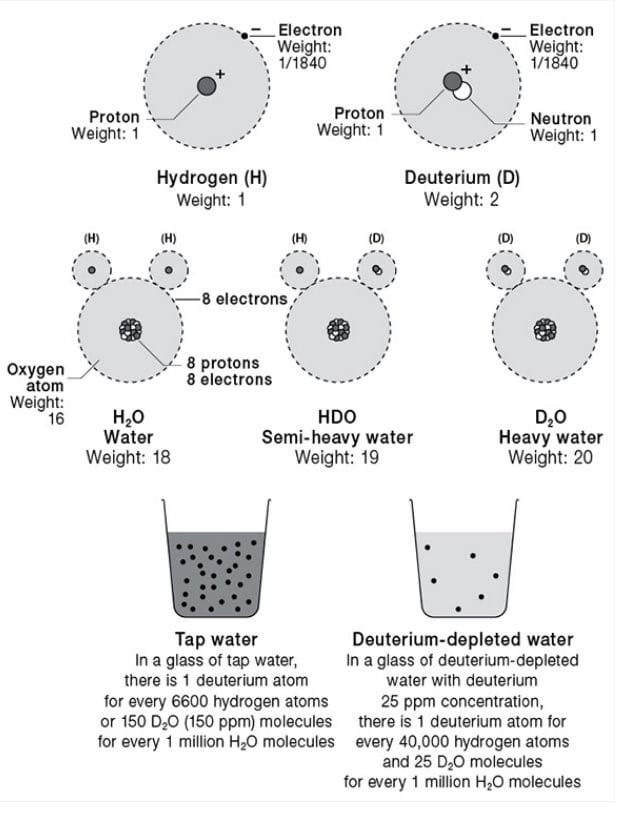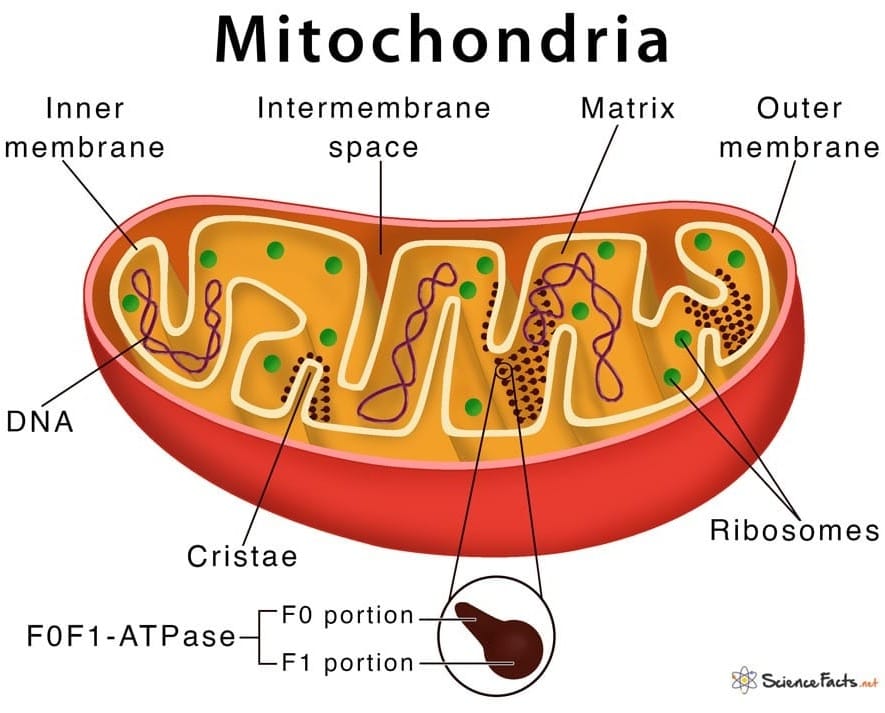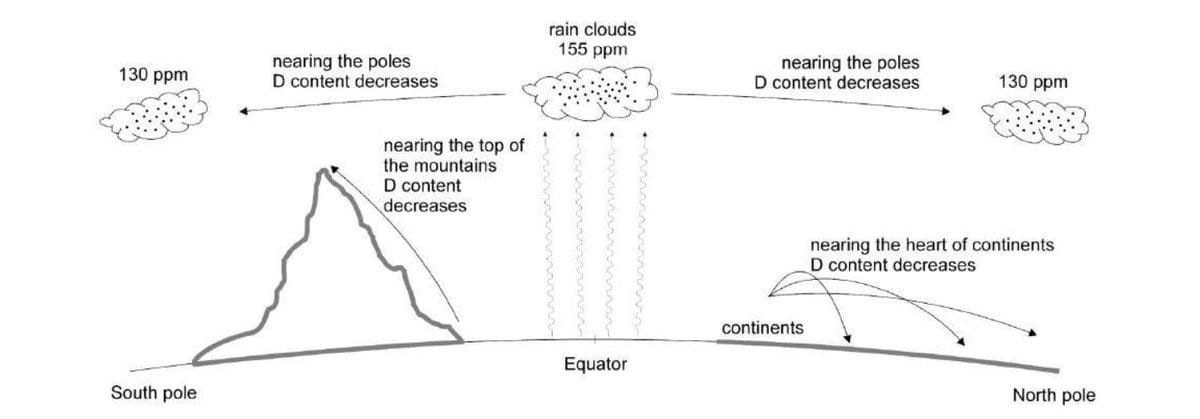Deuterium: Now That's Heavy...

The Deuterium Dilemma: Why This Weighty Hydrogen Might Be Dragging Down Your Health
You've optimized your finances. You've secured your Bitcoin. But have you custodied the most important asset you'll ever own—your health?
TL;DR: The Deuterium Dilemma
• Deuterium is heavy hydrogen (H₂) with an extra neutron, making it twice as heavy as normal hydrogen • This "heavy hydrogen" acts like sand in your cellular machinery, particularly damaging mitochondria • High deuterium levels are linked to cancer, metabolic disease, and neurodevelopmental disorders • Natural strategies to reduce deuterium include:
- Animal-based fats (especially from grass-fed sources)
- Strategic sunlight exposure (helps your body process deuterium)
- Deuterium-depleted water (naturally low in mountain springs or via freezing methods)
- Foods highest in deuterium include coconut water (156 PPM), corn (155 PPM), and wheat flour (150 PPM)
- Strategic management of deuterium may be one of the most fundamental yet overlooked aspects of health
- Just as you self-custody your Bitcoin, prioritize self-custody of your mitochondrial health
Today, we're diving deep into what might be the most overlooked aspect of optimal health and longevity: deuterium. While most health-conscious normies focus on macros, supplements, and workout routines, the very structure of the water in your cells could be silently undermining your mitochondrial function and overall wellness. Mitochondria are the energy centers of every cell and upstream of literally everything else happening inside you. If they falter so will your health.
What is Deuterium, and Why Should You Care?
Deuterium is an isotope of hydrogen—essentially hydrogen's heavier twin. While regular hydrogen has one proton and one electron, deuterium carries an additional neutron, making it twice as heavy. This seemingly small difference creates profound effects at the cellular level.
Dr. László Boros, in conversation on the Dr. Shawn Baker Podcast, describes deuterium as one of three forms of hydrogen, with deuterium being twice as heavy as regular hydrogen (protium) due to that additional neutron. YouTube's Carnivore Teacher offers a helpful analogy: deuterium is like an oversized RV trying to fit into a garage designed for a compact car, causing structural damage as it forces its way in.

The Mitochondrial Saboteur
Your mitochondria contain nanomotors that spin at incredible speeds to produce ATP, your body's energy currency. These nanomotors are precision instruments designed for regular hydrogen. When deuterium enters these mechanisms, it disrupts their function.

"When it [deuterium] goes in there it blows up... it's almost the best way to think about it, it's putting a ball bearing in the carburetor of a car, just totally seizing the engine." — Dr. Jack Kruse, Regenerative Health Podcast
This vivid description from Dr. Kruse helps us understand why deuterium can be so problematic. Dr. Boros furthers this explanation by describing how these mitochondrial protein complexes become inefficient when infiltrated by deuterium, potentially leading to a range of diseases.
The consequences? Reduced energy production, accelerated aging, and increased vulnerability to chronic diseases—including cancer, diabetes, and obesity.
Natural Deuterium in Our Environment
In ocean water, deuterium occurs at approximately 155 parts per million (PPM). According to sports nutritionist, Bob Seebohar, of eNRG Performance, a blog for runners, ideal deuterium levels in the human body typically range from 112-140 ppm, with 130 ppm considered optimal by many experts. Dr. Boros suggests that mitochondria specifically should operate with deuterium levels below 5 PPM for optimal function!

Modern living has disrupted our ancestral patterns of deuterium regulation, with processed foods, unnatural light exposure, and altered seasonal eating patterns all contributing to excessive deuterium burden.
Food Sources: Not All Calories Are Created Equal
The deuterium content of foods varies dramatically, and this might explain why some dietary approaches work better than others. Dr. Janine Bowring, ND has compiled a comprehensive ranking of high-deuterium foods to avoid:

- Coconut Water: 156 PPM
- Corn: 155 PPM
- Wheat Flour: 150 PPM
- Beet Sugar: 146 PPM
- Potatoes: 143 PPM
- Oats: 141 PPM
Interestingly, while coconut water is often touted as a health drink, Dr. Bowring notes that its high deuterium content makes it potentially problematic, especially for those not living in tropical regions. The flesh and oil of coconuts, however, remain healthier options due to their lower deuterium content.
The No.Mind account on X, @the_no_mind, has distilled Jack Kruse's extensive lessons on the subject into nicely digestible form and adds clarity on this topic:
"Why aren’t bananas a problem in the tropics? Because UV & Infrared light charge your cells. Sunlight structures water, raises redox, & strengthens mitochondria. A stronger redox state helps tolerate more deuterium. Sunlight is nature’s insurance against deuterium overload."
On the opposite end of the spectrum, animal fats (especially from grass-fed, pasture-raised animals) contain significantly less deuterium—typically below 130 PPM. This could explain why ketogenic and carnivore diets often produce remarkable health improvements. They're not just low-carb—they're low-deuterium approaches that protect mitochondrial function.
Tristan from Decentralized Health (@bitcoinand_beef) provides valuable insights on water quality and deuterium content. He explains that when evaluating water quality, we should consider "mineral content, purity of the source, and deuterium content (lower = 'lighter water' = better)." He further clarifies that deuterium is a heavier isotope of hydrogen, and "with our modern processed food diets & indoor lifestyle, we have an abnormally high level of deuterium in our body." While water isn't the only factor, it can make a significant difference in our overall deuterium load.

Tristan also makes a compelling point about local water sources: "It's always best to consume local spring water, because imported water is not of your environment and will absorb electromagnetic signals as it travels globally." For him, his local Wyoming snow melt or artesian well water offers the best deuterium profile, typically around 143 ppm – significantly lower than many commercial waters.
The Geography of Deuterium
Deuterium levels in water vary by location. According to Dr. Kruse, water found closer to the poles naturally contains less deuterium than water near the equator. Australia faces unique challenges due to its isolation in the Southern Ocean and distinctive hydrology cycle, resulting in higher deuterium content in its water.
This geographical variation might explain different disease patterns around the world and suggests that people living in different regions might need to adjust their approaches to deuterium management accordingly.
This graphic I found shown by EMF mitigation professional and "mitochondriac" Rusty: Solar Powered (X: @ze_rusty), illustrates this concept beautifully...

Sun Exposure: Your Natural Deuterium Regulator
One of the most fascinating aspects of deuterium regulation is the role of natural sunlight. UV light exposure helps your body process and eliminate deuterium, which contradicts common advice to avoid sun exposure, particularly for older individuals.
"The older you get, the more sun you need... that's exactly the opposite of what you guys are being told in Australia." — Dr. Jack Kruse
This surprising statement from Dr. Kruse challenges conventional wisdom about sun exposure as we age. Dr. Bowring emphasizes that without natural sunlight, our bodies struggle to deplete deuterium internally, potentially leading to energy depletion, weight gain, and general unwellness.
Optimizing Your Deuterium Levels: Practical Steps
1. Adjust Your Diet
The most effective way to reduce deuterium burden is through dietary changes. As noted by several studied voices in the space including Helios, @helios_brah on X, ketogenic and carnivore diets are effectively deuterium depletion diets because fats are naturally deuterium depleted.
Dr. Boros recommends a dietary composition of roughly 50-60% fat and about 30% protein to maintain deuterium levels close to 130 PPM. He makes the controversial suggestion that carbohydrates might be unnecessary given the liver's ability to produce glucose from the glycerol component of fat.
2. Deuterium Depleted Water (DDW)
Deuterium Depleted Water contains less deuterium than regular water. According to Bob Seebohar, DDW typically contains deuterium levels below the natural baseline of approximately 150 PPM. Commercial options exist but can be expensive ($10-30 per liter).
For a DIY approach, Hoohoohoblin on YouTube suggests a freezing method that takes advantage of deuterium's higher freezing point compared to regular water:
- Fill a container with filtered water and place it in your freezer
- Allow it to partially freeze (ice around the edges, liquid in the center)
- Drain the unfrozen water into another container
- Discard the ice (which contains more deuterium)
- Repeat the process 2-3 times for better results
3. Optimize Sun Exposure
Regular, safe sun exposure helps your body process deuterium more efficiently. Dr. Bowring offers tips for safe sun exposure that can help regulate deuterium levels naturally. Rusty: Solar Powered explains that stronger mitochondria produce more deuterium-depleted water, creating a beneficial cycle of improved cellular function.
4. Manage Water Intake
Contrary to popular advice, including my own, regarding the consumption of large quantities of water, Dr. Boros suggests following natural thirst signals rather than forcing excessive water consumption. This approach respects the body's anti-diuretic hormone regulation and may help maintain appropriate deuterium levels. This, however, does not apply to those suffering from chronic dehydration who must be forced to drink water or have to resort to IV hydration therapy; in this case, it would still be important to choose water with the lowest level of deuterium.
5. Improve Sleep Quality
Quality sleep helps regulate deuterium processing. Dr. Boros notes that during early sleep stages, the body efficiently uses glucose, while later sleep stages facilitate deuterium depletion. Those following ketogenic diets may experience more efficient deuterium drops during sleep, potentially requiring less sleep while feeling more rested. Strategic UV sun exposure and avoidance of artificial light like LED after dark is paramount to improving sleep quality.
Deuterium and Cancer Treatment
The connection between deuterium and cancer represents one of the most promising frontiers in metabolic oncology. Dr. Boros, in his interview with Dr. Shawn Baker, explains that "diabetes, obesity are the prime diseases, in cancer unfortunately, which relate to increased amounts of deuterium in cell organelles, especially DNA when we talk about cancer, and mitochondria when we talk about obesity and diabetes."
Cancer cells exhibit a peculiar metabolism known as the Warburg effect, where they consume large amounts of glucose but convert it to lactate even in the presence of oxygen – a metabolic inefficiency that puzzled researchers for decades. Dr. Stephanie Seneff from MIT offers a deuterium-based explanation for this phenomenon:
"The cancer cells get most of their ATP by converting glucose to lactate and they ship out the lactate and that's interesting too because the lactate is actually a low deuterium nutrient... and the cancer cells dump the lactate and then the lactate circulates. The brain loves lactate, the neurons really love lactate as a fuel."
This suggests that cancer metabolism may partly be a response to deuterium overload in the body. By producing low-deuterium lactate, cancer cells may paradoxically be providing essential nutrients to critical organs like the brain, heart, and liver.
More importantly, clinical research supports the therapeutic potential of deuterium depletion in cancer treatment. According to a post by Helios: "When CANCER patients drink Deuterium Depleted Water (DDW) they live more than 5x longer than average (2.4 vs 12.4 years avg. survival)." While more rigorous clinical trials are needed, these preliminary results suggest that deuterium depletion strategies could significantly enhance cancer survival rates.
JP Fanton (X: @HealthyFellow) references a systematic review published in the journal Nutrients examining "Deuterium-Depleted Water in Cancer Therapy," indicating growing scientific interest in this approach. The clinical evidence suggests that deuterium depletion doesn't just extend life but may improve quality of life for cancer patients by enhancing mitochondrial function throughout the body.
Deuterium, Neurodevelopment and Autism
The relationship between deuterium and neurodevelopmental disorders, particularly autism spectrum disorder (ASD), represents an emerging area of research with profound implications. Dr. Jack Kruse has proposed a compelling connection between deuterium, mitochondrial dysfunction, and autism rates.
According to Dr. Kruse, regions with high exposure to non-native electromagnetic fields (nnEMF), processed diets, and environmental toxins—such as California and New Jersey—show dramatically higher autism rates. He attributes this partly to maternal oocyte quality being compromised by these environmental factors, noting that "0G to 5G explains 1 in 100,000 to 1 in 36" autism prevalence.
This theory is supported by research showing that mitochondrial DNA mutates approximately ten times faster than nuclear DNA. Dr. Douglas Wallace, a pioneer in mitochondrial medicine, has identified a specific missense mutation in the ND6 gene that appears frequently in autism cases and is associated with light stress.
Particularly concerning is the observation that firstborn males often show higher autism rates. Dr. Kruse explains: "Firstborn males often get hit hardest because maternal Vitamin A stores—key for egg selection and retinal signaling—deplete fast in toxic settings. Light stress (blue or UV without six other colors) burns through Vitamin A faster, disrupting retinoic acid's role in gene regulation."
Dr. Stephanie Seneff from MIT further connects this to her research on environmental toxins: "Glyphosate messes up all these enzymes particularly in the gut so the gut microbes play a huge role in helping the host to manage deuterium and glyphosate messes them up." This disruption in deuterium management may contribute to the mitochondrial dysfunction increasingly recognized in autism spectrum disorders.
The deuterium-autism connection may also explain why subsequent children sometimes show fewer symptoms if maternal health improves, or why autism rates have risen in correlation with increasing environmental toxin exposure and electromagnetic radiation. By understanding these mechanisms, we may develop more effective preventative strategies and interventions focused on optimizing mitochondrial function and deuterium management.
Don't Trust. Verify.
As with Bitcoin, health optimization requires verification, not blind trust. The conventional advice to "eat less, move more" or "everything in moderation" fails to address the quantum mechanics at work in your cells.
Dr. Boros suggests we should "follow the deuterium" if we want to understand the root causes of health issues—a principle similar to "follow the money" in business investigations, and, as I hope I've underlined in this newsletter, health investigations as well. Just as you wouldn't trust a third party with your Bitcoin keys, why would you trust conventional wisdom with your health without verification?
Functional Testing: Your Health Explorer's Map
At Sleuth Wellness, my approach begins with comprehensive functional testing to establish your baseline mitochondrial function.
Dr. Boros outlines several testing methods, including MRI imaging, breath testing, and analysis of urine and saliva samples. These methods provide insights into deuterium distribution throughout the body's tissues and organs, offering a more complete picture than standard blood tests.
Unlike standard blood panels that only detect disease states, the functional labs you'll run with me reveal:
- Mitochondrial efficiency markers via the state of your HPA Axis function
- Metabolic efficiency indicators
- Oxidative stress status
[OFFERING: Reply to this email to schedule a complimentary health strategy consult to discuss which functional tests would provide the most valuable insights for your health journey. No obligation, just education.]
Beyond Carnivore and Keto
While carnivore and ketogenic diets naturally reduce deuterium load, they're not the complete picture. Some individuals struggle with strict animal-based approaches due to various factors.
Decentralized health advocate, Jack Schroder, notes that cold exposure can be particularly beneficial for those with leptin resistance when combined with ketogenic diets, helping to clear deuterium stores and restore mitochondrial function.
The Sleuth Wellness approach incorporates deuterium management by default, within a personalized framework that accounts for your unique biology, environment, and lifestyle constraints. I recognize that perfect shouldn't be the enemy of good—especially when "good enough" can be verified through objective testing. Is what your doing truly "good enough?" Don't trust. Verify.
[OFFERING: My programs combine deuterium management strategies with personalized nutrition, light exposure optimization, and nnEMF mitigation techniques. Targeted supplement protocols based on forward-looking lab tests support your body while as your mitochondria heal, with the end goal of minimizing or eliminating the need to take supplements at all. Limited spots available for Q2 2025. Reply to this email]
The Cost of Inaction
You wouldn't wait until your Bitcoin was stolen to implement security measures. Similarly, waiting until disease manifests before addressing deuterium overload is a costly strategy.
"TL;DR everyone is doing great on keto/carnivore because it's a deuterium depletion diet. Fats are naturally deuterium depleted." — HELIOS
This simple yet profound statement captures what might be the overlooked mechanism behind many popular diet success stories. Dr. Boros identifies diabetes, obesity, and cancer as diseases strongly linked to increased deuterium in cellular organelles—specifically in DNA for cancer and in mitochondria for metabolic disorders.
Final Thoughts: Self-Custody Your Health
Bitcoin taught us the value of self-custody for financial sovereignty. The same principle applies to health sovereignty.
Stephanie Seneff captures this perspective perfectly when she states her ambition: "I want to get deuterium to be a household word... Most people have no clue what it is and have no clue why they should care." As with Bitcoin, understanding deuterium requires challenging conventional thinking and exploring concepts that might initially seem complex or counterintuitive. Dr. Jack Kruse often emphasizes that "when you know better, you do better," and the evidence increasingly suggests that deuterium management may be one of the most fundamental yet overlooked aspects of human health.
Functional friend, George Ferman (@Helios_Movement) outlines a comprehensive approach to optimizing mitochondrial function, starting with full-spectrum sunlight exposure and proper nutrition, particularly noting the importance of spring water for those in high-deuterium regions like Australia.
By understanding and managing deuterium—a fundamental aspect of cellular function typically ignored by conventional medicine—you're taking the ultimate self-custody action: protecting the mitochondrial engines that power every aspect of your existence.
P.S. Have questions about deuterium management or mitochondrial optimization? Reply to discuss.